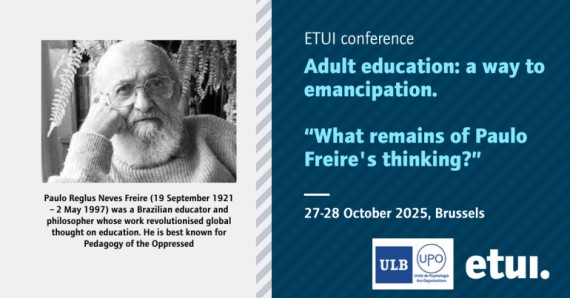
What Remains of Paulo Freire’s Thinking?
The Education department of the European Trade Union Institut (ETUI) in collaboration with the Free University of Brussels (ULB) is organising a hybrid conference entitled Adult Education: A Way to Emancipation. What Remains of Paulo Freire’s Thinking?
The conference will feature plenary sessions and panel discussions during which faculty members from European Universities; members of Paulo Freire institutes and trade unionists will present their insights.
Paulo Freire (1921-1997) was an educator and political philosopher who laid the foundation for popular education, a theory and teaching methodology “of the people” that emerged in the 1960s amid the struggle for social justice and socialism in Latin America.
Initially utilized by community educators and religious leaders working with impoverished populations in Brazil, Freire’s approach has significantly influenced adult educators worldwide.
Freire’s most renowned work, „The Pedagogy of the Oppressed,“ first published in 1968, is one of the most cited educational texts, particularly in Latin America, Africa, and Asia.
The traditions, theories, and methodologies of popular education have been employed in workers‘ education with the specific aim of building working-class organizations for social change. Additionally, trade union education has also been shaped by Freire’s ideas.
Objectives
The overall objective of the conference would be to revisit Paulo Freire’s thinking in light of contemporary socio-political context market by multiple crisis, right-wing populism and a decline in unionization. The conference will challenge educational practices in their abilities to empower us to have an impact on the world we live in. In other words, it will question the political and emancipatory dimensions of education.
This conference aims to address questions such as:
- What is the relevance of Paulo Freire’s thinking in a context characterized by rising inequalities, deregulation, flexibilization and precarization of work and privatisation of public services?
- What role does emancipatory pedagogies play today amidst various crises (social, ecological, and a crisis of representation)?
- How does Paolo Freire’s thinking strengthen democratic values in training and in society as a whole?
- How can trade union education, rooted in popular education principles, contribute to trade union renewal?

Dieses Werk ist lizenziert unter einer Creative Commons Namensnennung-NichtKommerziell-Weitergabe unter gleichen Bedingungen unter gleichen Bedingungen 3.0 Österreich Lizenz.
Volltext der Lizenz

